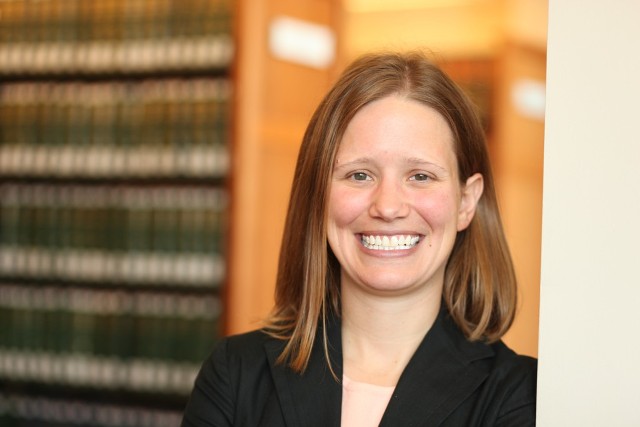Law Professor's Article Makes Top 10 List

Jill Lens, assistant professor of law at Baylor Law School.
Follow us on Twitter: @BaylorUMediaCom
An article by Baylor Law assistant professor Jill Lens on "Punishing for the Injury: Tort Law-Based Limitations on Punitive Damage Awards" was recently listed on Social Science Research Network's (SSRN) Top 10 download list for LSN: Judgments & Remedies. Statistics were based on the number of times the article was downloaded from Oct. 24 through Dec. 23, 2010.
"I only uploaded the article on Dec. 3, so I was surprised and excited that it made the top 10," Lens said.
In the article, Lens examines a potential conflict between the Supreme Court's recent opinions on the limitations of punitive damage awards. Generally speaking, punitive damages are awarded to punish and deter the defendant in a tort action if he acted with malice, reckless indifference or even if he was grossly negligent. The potential conflict that Lens explores is based on the differing conceptions of the award.
"Is it [the punitive damage award] a private law remedy, limited to resolving the dispute between the parties? Or is it a public law remedy, capable of addressing public harm and achieving public good? The Supreme Court has not wavered from public law ideas of punitive damages - that the damages serve the state's interests and are similar to criminal punishments. At the same time, the Court has focused on the actual injury to the plaintiff in its holdings and prohibited punitive damages from punishing for harm to nonparties," Lens writes.
Lens's article proposes a tort law-based explanation for the court's various holdings, which mandates a private law conception of punitive damages. According to Lens, tort law mandates this private law conception because tort law only has the ability when tort liability exists - and that is possible only if the defendant caused the individual plaintiff to suffer an injury.
"Punitive damages should thus be based only on the underlying injury for which the defendant is liable. The tort law-based explanation also mandates punitive damages not punish the public harm that the defendant's conduct created, that punitive damages be minimal if supported only by an award of nominal damages, and that punitive damages be personalized to the individual dispute despite pleas for predictability," she writes.
The article also will be published in the Hofstra Law Review.
One of Baylor Law's newest faculty members, Lens received her law degree from the University of Iowa College of Law, where she served as Note & Comment Editor of the Iowa Law Review. She graduated with highest honors, received the West Publishing Company Award for Outstanding Scholastic Achievement, and is a member of the Order of the Coif.
After graduation, she joined a mid-sized firm in St. Louis, and practiced commercial and appellate litigation. After four years of practicing, she accepted a position as a Visiting Assistant Professor at the University of Louisville Brandeis School of Law.
In the fall of 2010, Lens joined the Baylor faculty as an assistant professor. She teaches torts and appellate advocacy. Her prior publications address topics relating to professional negligence law and expert testimony, and damages.
The SSRN is dedicated to the rapid worldwide dissemination of social science research and is composed of a number of specialized research networks in each of the social sciences, including legal scholarship. The Legal Scholarship Network Research Paper Series offers institutions an avenue to showcase and distribute the research, both published and unpublished, of faculty and staff.
Contact: Julie Carlson, Baylor Law School, (254) 710-6681